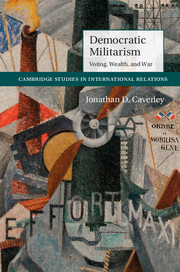Book contents
- Frontmatter
- Dedication
- Contents
- List of figures
- List of tables
- Acknowledgments
- 1 Introduction: sources of democratic military aggression
- 2 Cost distribution and aggressive grand strategy
- 3 Analyses of public opinion
- 4 Analyses of arming and war
- 5 British electoral reform and imperial overstretch
- 6 Vietnam and the American way of small war
- 7 Becoming a normal democracy: Israel
- 8 Conclusion: strategy wears a dollar sign
- Bibliography
- Index
2 - Cost distribution and aggressive grand strategy
Published online by Cambridge University Press: 05 July 2014
- Frontmatter
- Dedication
- Contents
- List of figures
- List of tables
- Acknowledgments
- 1 Introduction: sources of democratic military aggression
- 2 Cost distribution and aggressive grand strategy
- 3 Analyses of public opinion
- 4 Analyses of arming and war
- 5 British electoral reform and imperial overstretch
- 6 Vietnam and the American way of small war
- 7 Becoming a normal democracy: Israel
- 8 Conclusion: strategy wears a dollar sign
- Bibliography
- Index
Summary
The distribution of the costs of arming and war within the state influences the aggressiveness of that state's grand strategy. When all of the state's costs and benefits of a foreign policy decision are accounted for by the actor responsible for selecting the policy, costs are internalized. Shielding decision-makers from some of these costs results in cost redistribution, which can lead to moral hazard. Kant's (1991, 100) famous description in 1795 of the differences between despotic and republican approaches to war epitomizes this condition, “For the head of state is not a fellow citizen, but the owner of the state, and a war will not force him to make the slightest sacrifice so far as his banquets, hunts, pleasure palaces and court festivals are concerned. He can thus decide on war, without any significant reasons, as a kind of amusement.”
Kant's suggestion for why a despot might choose war for the most trivial of reasons anticipates contemporary democratic exceptionalism. Unlike democratic exceptionalism, I relax the axiomatic (if often tacit) claim that costs are always internalized within the electorate, arguing instead that costs for the median voter in death and taxes may be much lower than the per capita cost for the state. Thus the same potential incentives for aggression that Kant associates with despotism (in kind if not degree) exist in democracies. With little skin in the game for the average voter, a condition of moral hazard exists. Two specific means distribute away from this voter: economic inequality and military doctrine.
- Type
- Chapter
- Information
- Democratic MilitarismVoting, Wealth, and War, pp. 21 - 67Publisher: Cambridge University PressPrint publication year: 2014



